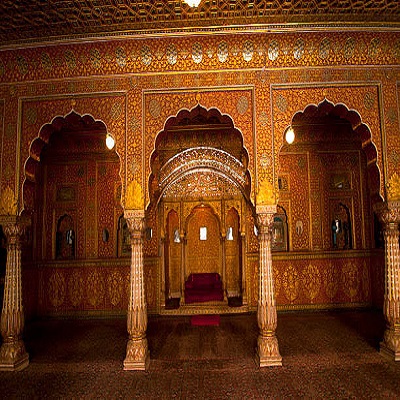
Junagarh Fort is a fort in the city of Bikaner, Rajasthan, India. The fort was originally called Chintamani and was renamed Junagarh or "Old Fort" in the early 20th century when the ruling family moved to Lalgarh Palace outside the fort limits. It is one of the few major forts in Rajasthan which is not built on a hilltop. The modern city of Bikaner has developed around the fort. The fort complex was built under the supervision of Karan Chand, the Prime Minister of Raja Rai Singh, the sixth ruler of Bikaner, who ruled from 1571 to 1611 AD. Construction of the walls and associated moat commenced in 1589 and was completed in 1594. It was built outside the original fort of the city (the first fort built by Rao Bikaji), about 1.5 kilometres (0.93 mi) from the city centre. Some remnants of the old fort are preserved near the Lakshmi Narayan temple.
Before the present Junagarh Fort was built, an old stone fort existed in the city. This fort was built in 1478 by Rao Bika who established the city of Bikaner in 1472. Rao Bika was the second son of Maharaja Rao Jodha of the Rathor clan, the founder of Jodhpur city. He conquered the large arid lands to the northern region of Rajasthan to set up his domain. As the second son of Jodha he had no chance of inheriting his father's territory of Jodhpur or to the title of Maharaja. He, therefore, reconciled and decided to build his own kingdom at Bikaner at the place then called "Jungladesh". Bikaner, though a partly of the Thar Desert, was considered an oasis on the trade route between Central Asia and the Gujarat coast since it had adequate spring water sources. Bika's name was thus tagged to the Bikaner city as well as to the then state of Bikaner ("the settlement of Bika") that he established. The history of Bikaner and the fort within it thus start with Bika. It was only about 100 years later that Bikaner's fortunes flourished under Raja Rai Singhji, the sixth ruler of Bikaner, who ruled from 1571 to 1611. During the Mughal Empire’s rule in the country, he accepted the suzerainty of the Mughals and held a high position of an army general in the court of Emperor Akbar and his son Emperor Jahangir.